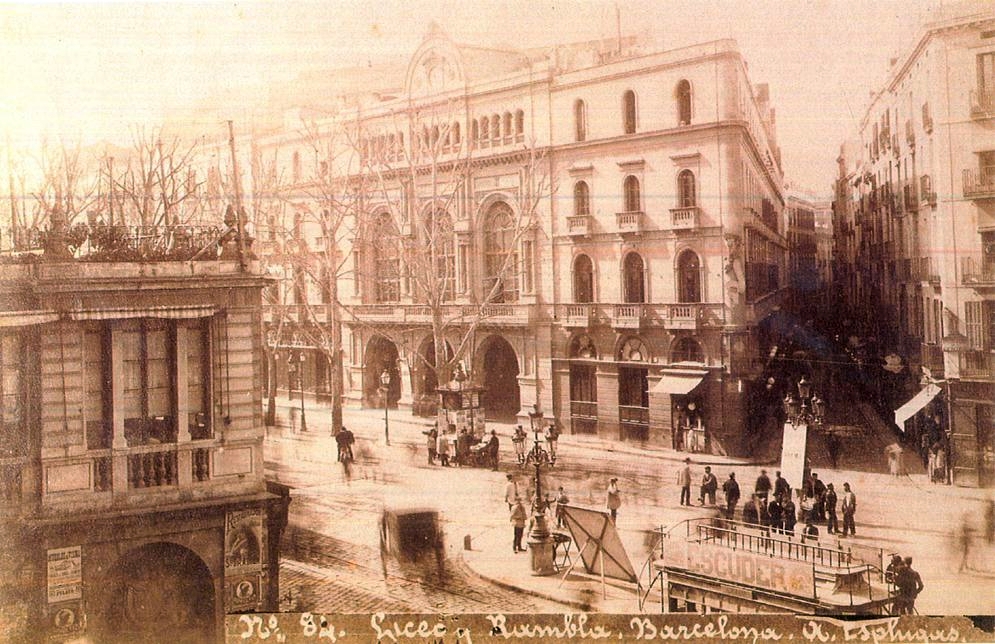
The Gran Teatre del Liceu in Barcelona, ca. 1880. Courtesy of Wikimedia Commons.
In the second half of the seventies, when I was in my twenties, I wrote letters home to Ireland from Barcelona. Early in 1976, for example, from my pension on the corner of Carrer de la Portaferrissa and Carrer del Pi, I described my first visit to the Liceu opera house.
Dear Mother,
The walls in this small, cheap hotel are thin. The man in the next room listens to opera on the radio. He looks like someone who has seen little daylight, but instead he has seen many operas, as he tried to explain to me in broken versions of several languages. Two days ago, he was waiting for me in the corridor. At first, I thought a fire had broken out or the police had, once more, attacked the people. He was saying something that clearly would require quick action on my part. Having calmed him down and got a dictionary, I realized that he had seen a production at the Liceu that was special, and he believed that I, as a matter of urgency, should see it too. It was Puccini’s La Boheme, and it starred Montserrat Caballé.
It was hard to know what to do when I went to the box office. Some of the prices for individual tickets would also buy you a studio apartment in the city. I bought the second cheapest type of ticket. When I showed it to my opera-crazed neighbor, he peered at it for some time, turned it around to check the back, and then shook his head. But this made no sense. It was the precise opera he had recommended, in the very venue he had suggested. What could be wrong with this ticket?
On the night in question, I arrived in good time. When I showed my ticket at the front door, I was directed to another door, less grand and auspicious, at the side. From there began a set of stairs that rose endlessly and grew narrower as they got higher. When, eventually, I found my seat, I discovered that I had no view at all of the stage, none. Standing up would not help, because there was not enough head room to stand up. Soon, others arrived and took up the seats around me. All of us were men, most of us were alone, and all of us were sad.
We grew sadder when the music began, in the sure knowledge that the stage must be bathed in beautiful light and the costumes must be gorgeous and the set superbly crafted. When our descendants, if we should be so lucky, were ever to ask us how we felt when Caballé first appeared on the stage and when she said that she was called Mimi, we would have to say that we did not see her and that hearing her was no compensation, it merely made us bitter, a bitterness that entered our spirits that night and never left.
The problem arose in act four. I could not bear it any longer as Mimi sang her farewell. I had paid my money, I needed to see what was happening on the stage so that I could write home about it. I could hear the singing and the orchestra as clearly as a hungry person can smell food. I felt a ratlike determination to see Caballé just once. Just once. I realized that leaning out from where I was would not work. I waited until a soaring moment, Caballé’s voice at its most splendid, and I not only leaned out but rested my two hands on the shoulders of each of the two men in front of me and propelled myself forward like a duck. That allowed me to catch a glimpse of the stage, just one glimpse, just for one second.
The men whose shoulders had thus been used went crazy. One of them called me a name that I will not repeat, especially in a letter to my mother, as it impugned my mother’s reputation in a way that is unmistakable. But, by that time, I had retreated into my cage, the place from where I could hear but not see. The problem was that my leaning had been less gentle than I had planned. I had clearly ruined the experience of a great high note for two members of the audience who had paid more money than I had.
And now they knew where I was.
When the opera ended, I did not wait for the applause. There is, as I have mentioned before, a fearsome set of policemen in Barcelona known as els grisos. They often glower at me suspiciously on the Ramblas. It isn’t merely that they have guns and batons but they have hatred in their eyes for people who do not know their place. I do not know my place. I needed to get out of that building before anyone reported me to nearby members of els grisos.
Back in the pension, my neighbor had a long face. He pointed at his ears to signal that I must have heard the music, and then he covered his eyes to mark the fact that I was among the unfortunate who did not catch sight of the almighty Caballé. I made signals like someone removing a blindfold. I let him know that I had in fact seen her, I had caught a glimpse of the great soprano in one of her most exquisite arias. But I did not explain how.
That, Mother, is all the news for now. The weather is nice. The dictator is still dead. Els grisos are still on the street.
Your loving son.
Colm Tóibín’s most recent book is The Magician. Belinda McKeon interviewed him for issue no. 242 of The Paris Review.
from The Paris Review https://ift.tt/OrapDFs
Comments
Post a Comment